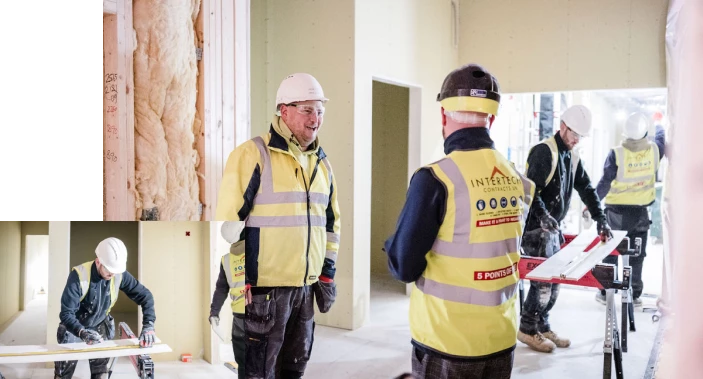
What Is Dry Wall Lining?
Many types of wall installations have a wide range of benefits for varying requirements and applications. If you’re not accustomed to specific trade jargon, you may be wondering precisely what is dry wall lining? At Intertech Contracts, we’re experts in all types of decorating and internal painting services, including Dry Lining. Understand and discover the benefits of choosing dry wall lining with Intertech Contracts.
Dry Wall Lining Explained
Dry lining is best explained as the process of lining or constructing walls with plasterboard. Plastering and rendering are well known for being relatively wet and time-consuming tasks. Whereas dry wall, also known as plasterboard, works as a dry alternative to plastering. Dry wall comes in individual panels that provide insulation and smooth quality finishes on interior walls.
Plasterboard is made from a mineral composed of hydrated calcium sulfate (gypsum). This is a diverse substance that is also one of the key ingredients in traditional wet plaster. After mixing gypsum with various materials like plastic, paper or foam - the plasterboard is ready for installation. Different additives can be included into the mixture to provide additional benefits. Other additives that strengthen or add some other quality, such as damp resistance or sound insulation, can also be added to the board.
Different benefits that are common with dry lining:
Super Lightweight. Dry lining is made with specific fibres and loosely packed components, making each dry panel extraordinarily lightweight and easy to transport.
Designed to prevent interstitial condensation: Thanks to its tapered edge design, that works to prevent dampness within a wall structure. A tapered design also helps to use less time for installation.
Strength: Different varieties of plasterboard provide good levels of strength and reliability. Dry lining wall installations are ideal for commercial and communal buildings as they also provide good sound insulation and energy efficiency.
Affordable: Dry lining is much more cost-effective than traditional wet plastering options. Firstly, the actual materials are typically much more affordable than other options. Combine this with the faster installation time; you can save on labour costs too.
Is Dry Wall Lining Better Than Plastering?
Traditional plaster is a wet, almost semi-liquid, paste that can take several days to dry once applied. It is used on walls or ceilings to provide a smooth surface and is usually pasted onto an existing wall. The main reason for plastering is to prepare the surface for paint or tiles.
However, dry lining is ‘dry’ because it is made from plasterboard. Plasterboard can cover both existing and newly built walls and surfaces. A dry lining setup creates a wall structure. This can be fitted with plasterboards to make a partition or entire wall and decorated further with paint or plaster. It’s a good idea to use tape and joint finishing options prior to painting or wallpapering directly onto the plasterboard.
The main drawback of using traditional ‘wet’ plaster is the prolonged drying time needed before progress can continue. Typically, this type of plaster can take several days to dry fully before you can paint or wallpaper and requires more paid hours for tradespeople. This can be an unwanted added expense for large commercial or communal projects that can quickly add up.
Depending on the requirements and time frames of certain projects, dry wall lining can provide a much more cost-effective and faster installation for larger projects, such as a school or commercial buildings. Dry wall lining provides a suitable cosmetic and functional base for all types of internal walls. Without the need for applying wet plaster and allowing drying time, your space can be reopened and used again much quicker.
Contact Intertech Contracts today
For more information about our expert dry wall lining service and any other professional and commercial decorating services, speak to a team member today.
Our services can be personally tailored to meet your specific requirements, location and budget. Get a quote today from our friendly team.
